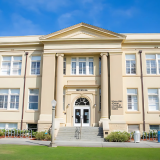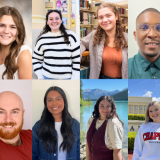Nicol Howard presents at South by Southwest EDU Math and Social Justice
April 6, 2016

The intersection of math and social justice might not be obvious to everyone. However, Nicol Howard, Ph. D, adjunct professor, and alumnus of Chapman University’s College of Educational Studies is the proverbial exception to the rule. In March, Dr. Howard was one of four participants chosen to speak at “Math as a Social Justice Lever,” a panel at Austin’s South by Southwest EDU conference, a gathering of about 5,000 educators, technology entrepreneurs, and campus leaders. Dr. Howard stated, “Unless we learn how to help every student understand how math is relevant to his or her life, we’re closing the opportunity for our students to connect to math in a meaningful way.”
Exactly how can math teachers pull the social justice lever? Dr. Howard and her colleagues shared numerous suggestions. Stephanie Cerda, Director of Innovation at St. Gabriel’s Catholic School in Austin urged teachers to talk about wages and salaries in math classes. Rafranz Davis, Executive Director, Professional and Digital Learning for Lufkin ISD, said teachers could talk about the concept of reparations, or the issue of how much it costs per person to keep someone in school versus prison, although she warned, “This may lead to some difficult conversations.” Dr. Howard explained that in her work over the years with preservice, new, and veteran teachers, she has encountered educators who feel unprepared to “teach the isms.” Yet, she added, having these difficult conversations in math classrooms may be a way to make “algebra and calculus more practical and meaningful to students.”
The fourth member of the panel, Rohit Agarwal, the general manager of Amazon K-12 Education, observed, “Numeracy today is what literacy used to be. If someone drops out of high school, their total earning over the course of their life is 5% versus a college graduate. In the knowledge economy, not understanding science and math is a mistake. Every career will have elements of STEM (science, technology, engineering and math) in it.”


